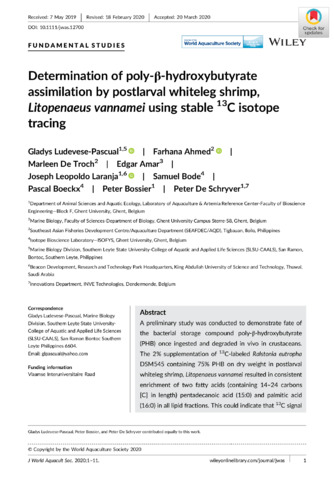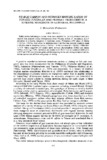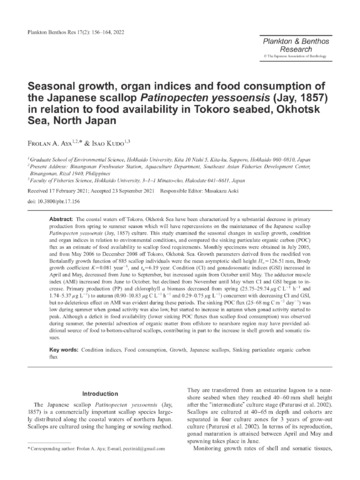Diet-tissue stable isotopic fractionation of tropical sea cucumber, Holothuria scabra
Share
| dc.contributor.author | Watanabe, Satoshi | |
| dc.contributor.author | Kodama, Masashi | |
| dc.contributor.author | Sumbing, Joemel Gentelizo | |
| dc.contributor.author | Lebata-Ramos, Maria Junemie Hazel | |
| dc.date.accessioned | 2015-05-21T03:38:26Z | |
| dc.date.available | 2015-05-21T03:38:26Z | |
| dc.date.issued | 2013 | |
| dc.identifier.citation | Watanabe, S., Kodama, M., Sumbing, J. G., & Lebata-Ramos, M. J. H. (2013). Diet-tissue stable isotopic fractionation of tropical sea cucumber, Holothuria scabra. Japan Agricultural Research Quarterly, 47(1), 127-134. | en |
| dc.identifier.issn | 0021-3551 | |
| dc.identifier.uri | http://hdl.handle.net/10862/2238 | |
| dc.description.abstract | To provide a basis for a stable carbon and nitrogen isotope ratio \(\mathsf{(\delta^{13}C / \delta^{15}N)}\) analysis to determine the assimilated organic matter in sea cucumber, Holothuria scabra, diet-tissue fractionations were experimentally determined by mono-feeding rearing with diatom. While δ15N fractionation of the whole body wall (2.4‰) was similar to the commonly accepted value (2.6 - 4‰), δ13C fractionation of the body wall (4.2‰) showed considerable discrepancy with the commonly accepted value (0 - 1‰) due to the high content (35% dry wt/wt) of calcareous spicules (CaCO3) in the body wall, which had significantly higher δ13C (-8.6‰) than the organic fractions. Computational elimination of spicules based upon spicule content and spicule δ13C reduced the δ13C fractionation of the body wall to 1.5‰, close to the common value. δ13C fractionation after spicule removal by acid decarbonation and subsequent rinsing (3.2‰) did not agree with the common value, and δ15N fractionation was significantly elevated by decarbonation. δ15N and δ13C fractionations of the intestine (1.5 and 2.2‰, respectively) did not agree with the common values. Since δ13C and δ15N of the feces did not differ significantly from those of the diet, feces may be used to determine ingested organic matter in the wild. | en |
| dc.description.sponsorship | This study was funded by the Japan International Research Center for Agricultural Sciences (JIRCAS). | en |
| dc.language.iso | en | en |
| dc.publisher | Japan International Research Center for Agricultural Sciences (JIRCAS) | en |
| dc.relation.uri | https://www.jstage.jst.go.jp/article/jarq/47/1/47_127/_pdf/-char/en | |
| dc.subject | Sand fish | |
| dc.subject | Holothuria scabra | en |
| dc.subject | Holothurioidea | en |
| dc.title | Diet-tissue stable isotopic fractionation of tropical sea cucumber, Holothuria scabra | en |
| dc.type | Article | en |
| dc.citation.volume | 47 | |
| dc.citation.issue | 1 | |
| dc.citation.spage | 127 | |
| dc.citation.epage | 134 | |
| dc.citation.journalTitle | Japan Agricultural Research Quarterly | en |
| dc.subject.asfa | diet | en |
| dc.subject.asfa | marine invertebrates | en |
| dc.subject.asfa | ratios | en |
| dc.subject.asfa | organic matter | en |
| dc.subject.asfa | carbon isotopes | en |
| dc.subject.asfa | phytoplankton | en |
| dc.subject.asfa | body walls | en |
| dc.subject.asfa | carbon | en |
| dc.subject.asfa | intestines | en |
| dc.subject.asfa | tropical climate | en |
| dc.subject.asfa | calcium carbonates | en |
| dc.subject.asfa | nitrogen isotopes | en |
| dc.subject.asfa | nitrogen | en |
| dc.identifier.doi | 10.6090/jarq.47.127 | |
| dc.subject.scientificName | Bacillariophyceae | en |
| local.subject | calcium carbonate | en |
| local.subject | C/N ratio | en |
| local.subject | spicule | en |
Files in this item
| Files | Size | Format | View |
|---|
This item appears in the following Collection(s)
-
AQD Journal Articles [1231]
These papers were contributed by AQD staff to various national and international journals



